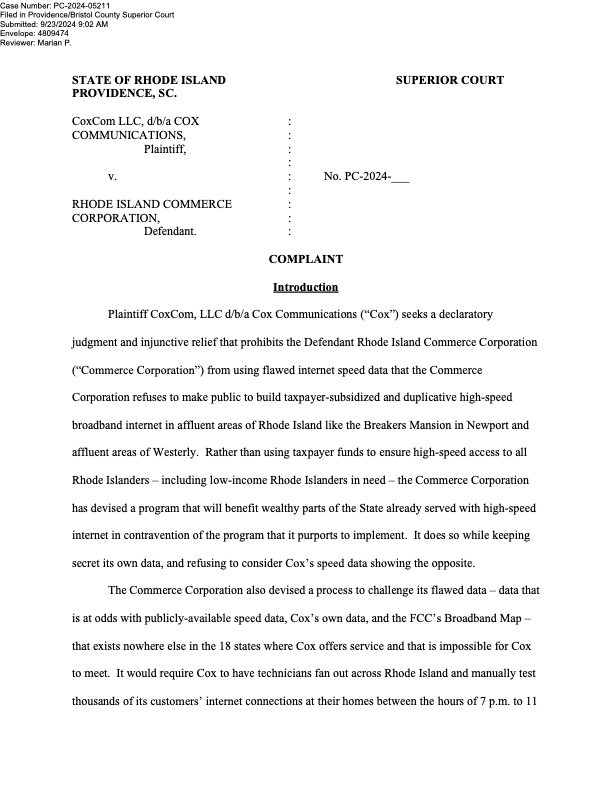Cox Sues to Block Rhode Island's BEAD Map
The company said it wasn't able to contest the state's claim that some of its subscribers were underserved.
Jake Neenan

WASHINGTON, Sept. 24, 2024 – Cox Communications asked judges Monday to block Rhode Island from going ahead with its plan for more than $100 million in broadband expansion grants.

Cox v. Rhode Island Complaint
In preparation for implementing its $108 million portion of the $42.5 billion Broadband Equity, Access, and Deployment program, Rhode Island was required to solicit challenges to government broadband coverage data. Cox asked Rhode Island Superior Court judges to invalidate the state’s map – which is still being ironed out – arguing the company wasn’t given the chance to prove it served certain households.
Using the Federal Communications Commission’s broadband map as a base, the state used speed test data to mark some locations as BEAD-eligible before taking challenges, something allowed by program rules. That led to about 30,000 locations in Cox’s footprint being marked as underserved, meaning they receive speeds slow enough to be eligible for new BEAD-funded infrastructure.
The fear from Cox is that locations where it says it already provides adequate service will be overbuilt with BEAD money.
Cox said in its complaint that the state’s standard for ISP rebuttals, countervailing speed test data from 75 percent of a contested census block group, was impractical. Most states have opted to set the requirement at 10 percent.
“Let’s be clear about what’s behind Cox’s lawsuit: It is an attempt to prevent the investment of $108.7 million dollars in broadband infrastructure in Rhode Island, likely because it realizes that some, or even all, of that money may be awarded through a competitive process to other internet service providers,” the Rhode Island Commerce Corporation said in a statement to Broadband Breakfast.
The company said about 70 percent of its customers use Cox-owned modems, which can be tested remotely, but some number of customer-owned modems would need to be tested on-site – at least 5 percent, but potentially more because locations have to be selected randomly. Cox claimed it lacked the manpower to conduct enough on-site tests.
“Their challenge process would be incredibly disruptive to our customers including an interruption to their service,” Stephanie Federico, Cox’s vice president of government affairs, said in a statement. “With over 500 employees in Rhode Island and a state where we have made significant investments, we are compelled to seek a court remedy as we are left with no other option.”
Cox did submit challenges to its coverage area, which the complaint said were able to test about 41 percent of the contested locations by sampling just the Cox-owned modems. Cox said it found almost all of those received service that would make them ineligible for BEAD.
The company didn’t tell the state it only tested 41 percent of the locations at the time, though, which partly led to Rhode Island denying a July request from the company to waive its 75 percent rule.
“On one hand, Cox expressly states in the July 3 Letter and in the Petition that it is impossible to meet the seventy-five percent threshold in the Challenge Requirements,” the state wrote in its denial.
“But, on the other hand, in the attestations of the Cox Challenges, Mr. Stamp [Cox's vice president of givernment affairs] attests that the tests that Cox performed ‘were conducted in a manner consistent with the requirements’ set forth in the [BEAD plan]—i.e., the testing of seventy-five percent of its customers simultaneously and randomly.”
But the main reason the state denied Cox’s petition was the timing. The company submitted the request on July 3, three days before the window to submit challenges ended. Rhode Island said that didn’t leave enough time to consult with the National Telecommunications and Information Administration, the federal agency that manages BEAD and would ultimately have to sign off on any waiver the state granted.
“To suggest that the Corporation and other stakeholders and participants should restart the [BEAD] challenge process to accommodate a waiver request made at the eleventh-hour flies in the face of fairness and equity,” the state wrote.









Member discussion